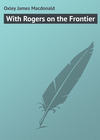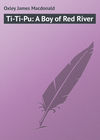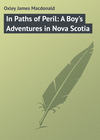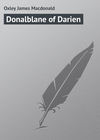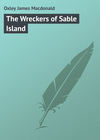Читать книгу: «With Rogers on the Frontier», страница 8
CHAPTER XV
FORT WILLIAM HENRY IN DANGER
It was about two o'clock when the first volley fell upon the startled Rangers, and through the long afternoon they had fought doggedly, repelling the successive assaults of their antagonists on flank and centre, and taking toll of them for every gap in their own ranks at the rate of two to one.
The Indian allies of the French had at the first been very active, gliding hither and thither as silently as snakes, or whooping fiercely as they darted from tree to tree in their endeavors to close in on the stubborn provincials. But when the deadly aim of the latter had cost them a score of their number they lost heart, and in spite of the urging of the French sulked at a safe distance.
After Major Rogers was wounded Seth had kept at his side, for he felt a kind of presentiment of further harm to his leader, which a little before sunset was fulfilled by a stray bullet wounding the Major in his hand and wrist so badly that he could no longer use his gun.
"You had better lie down, sir, where they cannot see you," Seth begged of him, "and I will fire your gun as well as my own."
It was hard for the Major to follow this sound advice, but his wounds compelled him, and for the rest of the day Seth did double duty not only as far as firing went, but in carrying his commander's orders to the other officers who were farther away.
As darkness drew near, the French redoubled their endeavors to rush the position held by the Rangers; and more than once it seemed as if they might succeed, but by the most heroic bravery and the wonderfully effective use of their guns the Rangers kept them off until at last the shadows of night enveloped the battlefield and compelled a cessation of the struggle.
Gathering his officers about him the wounded leader announced his purpose.
"We're in a pretty bad fix, I reckon," he said in a tone whose gravity showed how critical he considered the situation. "The rascals have trapped us like rats, but we're not the men to die like rats, even if we've lost a good part of our number and our ammunition is nearly used up. Ticonderoga is so close that there'll be sure to be reinforcements brought against us in the morning and we must get out of this to-night by hook or by crook. After an hour's rest we'll make a start, and if we've to fight every foot of the way we'll do it, for we're not going to surrender, are we, Rangers?"
"No, no, we'll die first," was the unanimous response heartily given and then the officers returned to their men to give them directions.
About seven o'clock the Rangers began their difficult, dangerous retreat. The rain had ceased to fall, but the snow was water-soaked and the trees dripped from every branch. Even if the men had been in good condition they could not have moved rapidly; but wearied as they were, and some of them having to be carried on extemporized litters, rudely made of boughs, their progress necessarily could be little better than a crawl, and yet at any moment out of the surrounding darkness a horde of merciless savages might burst upon them ravening for their blood.
Despite his wounds Major Rogers took the lead; and as he strode forward with head erect and firm, set figure Seth followed in a spirit of unstinted admiration, ready to lay down his own life in defence of his heroic leader.
Halting frequently for the rest that was imperative they tramped on through the dreary winter night, their hope of escape strengthening as they got farther and farther away without being attacked.
At one of their halts Seth asked the Major:
"If they leave us alone to-night, sir, do you think they're likely to follow us to-morrow? We'll be a good way from Ticonderoga by daybreak and maybe they'll not care to go very far in case we should get reinforced."
"If we can keep clear of the villains to-night we'll have no more trouble with them this time," responded the Major with a grim smile. "They'll not care to follow us any farther than they can help, I'm sure of that."
And as it turned out he was right in his surmise. Left unmolested all night, the Rangers neither saw nor heard anything of the enemy on the following day, and kept steadily on their way back to Fort William Henry, which they ultimately reached at cost of great exertion, but happily without having to leave behind any of their wounded.
Out of the seventy-five which had gone forth one week before, less than fifty returned uninjured, and six more wounded, the remainder having been either killed or taken prisoners.
It was the first severe loss the Rangers had sustained since their organization, and they felt it deeply, but it did not chill the enthusiasm of the survivors. On the contrary, it only inspired them to greater zeal, and so soon as their leader had recovered from his wounds, they would be ready for fresh service against the enemy, to whom they now owed a greater grudge than ever.
It chanced, however, that Major Rogers' wounds resulted in a serious illness, upon the head of which followed an attack of smallpox, and this led to a change in Seth's circumstances, as with a number of the Rangers he was assigned to strengthen the garrison at Fort William Henry. He did not like this, for the monotony of garrison life was irksome to one of his restless nature; but he had no option in the matter, and accepted the situation as cheerfully as possible.
If he had known what was in the mind of Vandreuil, the Governor of Canada, he would have been more content at the change, as the French commander-in-chief, having been apprised of the preparations the English were making all too deliberately for the assault and destruction of Ticonderoga and Crown Point, resolved to anticipate their action by striking an unexpected blow, and accordingly set about getting ready at Montreal a strong force for the attack of Fort William Henry.
The work was well done, no pains or expense being spared in the equipment of the expedition, which comprised regular soldiers, Canadians, and Indians. They were provided with overcoats for the day and blankets and bearskins for the night, with ample supplies of spare moccasins and mittens, with kettles, axes, flints and steels, and many miscellaneous articles, together with twelve days' provision, the whole being packed on light Indian sledges, which were easily dragged along. No less than a million francs, equal in value to as many dollars of the present time, were spent upon their force, which reached Lake Champlain before the end of February.
At Ticonderoga they rested for a week, and made ready more than three hundred short scaling ladders, so constructed that two or more could be joined into one long one. Then marching for three days on the ice of Lake George they neared Fort William Henry on the evening of the 18th of March, and prepared for a general assault at break of day. They were sixteen hundred in all, and being pretty well informed of the strength of the English garrison, and knowing that they had no suspicion of their proximity, they felt perfectly confident of carrying all before them.
Now at this time the garrison of Fort William Henry, including the Rangers, consisted of only three hundred and fifty-six effective men. Moreover, the fort was not very strongly built; and even if nearly a score of cannons of different calibre, besides several swivels and mortars, were mounted upon the log ramparts, it was at best ill prepared to withstand a well-organized attack, so that the French had good ground for being quite sanguine of the result of their enterprise.
On the night of the 18th Seth had charge of the sentries, and although he might have taken it easy on one of the bastions, he preferred to pace up and down the ramparts, exchanging an occasional word with the men on guard.
An hour after midnight, as he was standing beside one of the bastions which faced the lake, and speculating as to how long he might have to stay at the fort, and whether Major Rogers would soon recover from his sickness, the sound of distant chopping came to his ears, and presently he perceived the faint glare of far-off fires.
"Hullo!" he exclaimed. "That can mean only one thing. The French have come down the lake to attack our fort, and have made those fires to keep themselves warm. They must think we all go to bed here at night, and leave the fort to take care of itself, but they're greatly mistaken. I must rouse the whole garrison at once."
This he proceeded to do as quietly as possible; and on the commander being informed, he forthwith gave orders for all the cannon that commanded the lake to be double-shotted, and the gunners to stand in readiness to fire them at short notice.
Then Seth asked permission to try a little scouting on his own account.
"I'd like to find out how many there are of them if I can manage it. May I see if I can get near enough to make a good guess? If they catch me you'll only be one man short."
The commander smiled admiringly at his ardor and indifference to danger.
"It certainly would be a good thing to know their strength," he said; "and if you're willing to run the risk, I wish you God-speed."
"All right, sir, then I'll go," responded Seth; and putting off everything that would encumber him, he vanished into the darkness on his perilous mission.
It was an intensely still, starless night; and if Seth had not known every foot of the ground by heart he might have come many a cropper as he hurried in the direction of the fires, pausing at intervals to listen for any sound betokening the enemy's approach, and then going resolutely on again until he had got within a few hundred yards of the encampment.
Here he came to a full stop in order carefully to consider the situation.
"If I go any farther in this direction I may be caught by some of their outposts; yet I'm not near enough to find out what I've come for," he soliloquized. "I think perhaps I'd better try around to the right."
Accordingly he made a detour which brought him to the side of the French position, and there the cover of the trees made it possible for him to draw so close to the camp fires that he could plainly see the figures of the men about there and even overheard their talk.
"Bless my heart, but they're as thick as flies," he exclaimed under his breath, with a feeling of consternation at his heart. "They outnumber us completely. I'm afraid they'll take the fort."
As he watched them moving to and fro in the light of the fires he became aware that they were getting ready for a concerted movement, and presently they formed up in regular array upon the ice which happened at the time to be clear of snow.
"They're going to march on the fort right away," said Seth to himself. "I must get back and give warning."
The French had taken the precaution to send out many scouts in advance, and these were now spread over the space intervening between their camp and Fort William Henry, and Seth therefore had to run the gauntlet of them ere he could regain the fort. Consequently every step was full of danger; and he moved with the utmost caution yet as swiftly as possible, for the moments were precious in the extreme.
Once and again he passed so close to one of the scouts that he could almost have touched him; but his intimate knowledge of the ground stood him in good stead, especially since the others were warily feeling their way, and he escaped discovery as it were by the skin of his teeth.
He had left the encampment far behind, and was about congratulating himself upon having successfully passed all danger when he was challenged by a scout, who suddenly rose right in his path.
His only weapon was the hunting-knife which hung in his belt; and he did not attempt to use that, but replied to the challenge by hurling himself at the scout head down, butting the astonished Canadian full in the stomach, and tumbling him upon his back while his gun flew out of his hands, and fell beyond his reach.
So completely was the wind knocked out of him that he could not even swear at his assailant, who had disposed of him in such unlooked-for fashion; and Seth, not waiting to do him any more harm, dashed on to the fort, where the commander was anxiously awaiting his return.
"They're more than a thousand strong," he panted, "and they're coming up on the ice right away. They'll be here soon."
"Well, we're ready for them," replied the commander resolutely; "and though they are four times as strong as we are, they'll find they have no easy task to get the best of us."
Half an hour after Seth's return the sound of many men marching rapidly over the smooth ice reached the ears of those at the fort, and the commander gave orders for the gunners to be ready to fire the cannon the instant he gave the word.
He rightly judged that the best way of showing the enemy that their hope of surprising the fort was not to be realized was by receiving them with the heaviest broadside he could manage to bestow upon them, and so he waited for them to approach near enough to render his method of greeting most effective.
The tense expectancy of the little garrison may be imagined, as listening in breathless silence they heard the steady approach of their assailants; and their commander seemed to wait so long before giving the order to the gunners that they grew impatient and restless.
But at last clear and firm the command:
"Make ready. Fire!"
rang out upon the stillness of the night, and was instantly followed by a sudden burst of flame and a tremendous explosion that sent the startled echoes flying far over the bosom of the frozen lake, to reverberate from the snow-clad hills on the opposite shore.
CHAPTER XVI
THE FOILING OF THE FRENCH
Without waiting to ascertain the effect of the first broadside of grape and round-shot, Major Eyre, the commander of the fort, gave orders to reload the cannon for a second discharge.
But this was not required. From the cries and shouts that were heard in the direction of the enemy it was evident that there had been deadly work done in their ranks, and that they were thrown into confusion and panic.
"I should not wonder if we've stopped them for the present," said Major Eyre cheerily, "and that we'll have no more trouble from them to-night."
In which surmise he proved to be correct, for the French were so smitten with consternation by the utterly unexpected storm of shot and shell that they incontinently turned about and retreated to their encampment pell-mell, to the vast rage and disgust of Rigaud, their commander, who stormed and swore at them in a vain effort to stay their flight.
Highly gratified as they in the fort felt at the foiling of this attempted surprise, they knew very well that another attack would certainly be made; and Major Eyre, as soon as it was daylight, despatched two of the fleetest-footed rangers on snow shoes to Fort Edward to obtain reinforcements if possible, he being resolved to hold out until the very last moment.
Not long after daybreak the French reappeared in full force, filing off to surround the fort upon which they kept up a brisk fire of musketry, although they had better have spared their ammunition, as the garrison took good care not to expose themselves, and the bullets buried themselves harmlessly in the stout ramparts.
"If it amuses them it does not hurt us," remarked Major Eyre with a satirical smile; "and we need not complain so long as they keep so respectful a distance."
On their part the garrison were by no means idle, Seth and his Rangers in particular seizing every chance for a shot; and the excellence of their guns, combined with the accuracy of their aim, enabled them to make many of their shots tell.
Once when the commander was standing by him he said to Seth:
"Do you see that officer over there on the right, who seems to be urging his men to advance closer?"
"Yes, sir," replied Seth. "I know the one you mean."
"Well, do you think you can pick him off for me? He evidently thinks he is out of range, but perhaps you can show him he's mistaken."
Seth measured the distance carefully with his eye. It was a very long shot, and the officer being in almost constant motion rendered it still more difficult, but he considered it worth trying, and said so to Major Eyre.
"Let me see then what you can do," was the response.
Seth loaded his gun with nicest care, and took aim with much deliberation, waiting until the officer should be still for a moment before he fired.
At last he pulled trigger; and as the report rang out the Frenchman staggered, threw up his arms, and then pitched forward upon the snow.
"Capital! capital!" exclaimed the commander enthusiastically. "I never saw a better shot in my life. Where did you learn to shoot like that, Ensign?"
Seth blushed with pleasure at this praise of his marksmanship, and answered modestly:
"At home on the farm, sir. I've been used to handling a gun ever since I was a little chap."
"Aha, that accounts for it," said Major Eyre. "Such skill is not to be acquired in the army. If all our men could take lessons from you, they'd be much the better for it. Well, you've given that poor chap his quietus. We'll see no more of him."
The loss of their leader so startled the soldiers that they scuttled off out of range in a way which highly amused those who were watching them from the fort.
"They know how to take care of themselves," was Seth's smiling comment as he reloaded his gun. "But we'll have more trouble from them yet."
They made no further demonstrations during that day, however, but in the course of the night they again attempted to approach on the ice, and were again repelled by a broadside from the cannon which the watchful garrison let fly at them so soon as they were heard advancing.
Being thus once more balked of their intention they sought to vent their rage by burning two sloops that were ice-bound on the lake before the fort, and a large number of bateaux drawn up on the shore.
So soon as he realized their purpose Major Eyre himself sallied out at the head of a party to endeavor to protect the craft, but they were too late. The flames quickly took possession, and could not be controlled, and ere morning both sloops and bateaux were completely consumed.
The next day was the Sabbath, and it seemed at first as if the French were going to respect the day by remaining quietly in camp; but at noon they filed out of the woods, and marched across the ice, ostentatiously parading their scaling-ladders, and making as imposing a demonstration of their strength as possible.
"They're surely in earnest this time," said Seth as he watched their martial movements, which were so carefully studied to inspire the little garrison with apprehension. "We're not to spend our Sunday in peace after all."
"There's no telling," responded Major Eyre. "They may be only making a feint in the hope of scaring us into surrender."
Coming to a halt while still at a safe distance, the French sent forward a small party whose officer bore a red flag; and rightly judging that this was the signal for a parley, Major Eyre bid Seth take a handful of his Rangers and go out to meet them.
He gladly obeyed the order, and presently returned with the chief of the Canadian artillery, Le Mercier, who on being led blindfold into the fort, announced himself as the bearer of a message from his commander.
He was conducted to the room of Major Eyre, where the other English officers were assembled, and courteously invited to deliver his message.
"I am sent by my commander, General Rigaud," he said in a suave yet dignified tone, "to present his most respectful compliments, and to say on his behalf that he invites you to surrender the fort without further fighting, and in event of your doing so, assuring you of his protection; but if you refuse, he will without delay make a general assault, and when the fort is taken, put the whole garrison to death or deliver them to the Indians to be tortured."
Having thus spoken with impressive emphasis, Le Mercier swept the group of officers with a penetrating glance from his dark eyes, and then assumed an attitude of respectful attention as he awaited the English commander's reply.
Major Eyre hesitated only long enough to look into the faces of his subordinates for an instant, and, being satisfied with what he read there, proceeded with his response.
"Convey to your commander my compliments and inform him how deeply I appreciate his kind consideration in thus giving me the opportunity of surrendering without the loss of my garrison; but at the same time assure him of my regret that I cannot accede to his proposition, as I and these with me are fully determined to defend the fort to the very last."
There was no mistaking the decision with which he spoke, and Le Mercier, suppressing a pitying smile at the folly of the English in imagining they could withstand so superior a force as he represented, bowed gracefully and withdrew, being blindfolded again until he had been conducted outside the fort.
On his return to them the whole French force advanced as if to storm the ramparts, and the little garrison prepared for a desperate defence; but to their mingled amazement and relief the enemy contented themselves with another fusillade that did no more harm than the first and then wheeled about and returned to camp.
"Well, upon my honor, that's the queerest proceeding I've ever seen," exclaimed Major Eyre laughingly. "What can have frightened them this time that they retreat before we've fired a shot at them?"
There was something the matter, although he did not know it; and that was the material out of which the French force was chiefly composed, namely, Canadians and Indians, who were not at all suited for the work at hand. Useful as they undoubtedly were for scouting, and for fighting in the forest with plenty of cover, they had no stomach for such service as was now required; and in reality out of his sixteen hundred men the only ones upon which Rigaud could rely were the comparatively few regular soldiers he had with him, who, however brave and willing they might be, were not by themselves equal to the taking of the fort.
This was the explanation of what seemed like ludicrous vacillation on his part, and for which he was not so much to blame as his opponents imagined.
Well pleased at the retirement of the French, but still puzzled to guess what they would do next, the English spent the rest of the day in strengthening the defences of the fort, and making every preparation against a night attack.
When night did come the French were heard advancing again, and those in the fort nerved themselves for what they took for granted would be a supreme effort on the part of their foes.
Yet once more were they misled, as the real object of the assault proved not to be the fort itself, but the buildings outside of it, which consisted of several storehouses, a hospital, a sawmill, and the huts of the Rangers, besides a sloop on the stocks, and a number of scows and whale-boats.
Under cover of the night the French crept up carrying fagots of pine, and placing them against the farther side of the buildings, set them on fire, taking care to escape before the flames broke out sufficiently to make them visible to the watching English who, straining their eyes to penetrate the darkness, fired wherever they thought there was a chance of hitting them.
If they were not particularly successful as besiegers, however, they certainly were as incendiaries, for in the course of the night they had every building ablaze, and the burning cinders fell inside the fort in such showers that it required hard work on the part of the garrison to save the barracks and other buildings from being set on fire.
Happily the elements came to their aid in the very crisis of their danger, for a thick fall of snow began filling the air with large moist flakes which soon covered the roofs, and effectually protected them against the danger of ignition.
This snow-fall continued all that day and all the next night, not stopping until the ground was covered to a depth of quite three feet; and while it lasted the French lay quiet in their camp, so that their opponents were enabled to gain some respite from the strain they had been enduring.
A little before dawn on Tuesday twenty of the regulars, inspired no doubt by the desire to do all the damage to the enemy that they possibly could, made a bold attempt to burn the sloop on the stocks, and the several hundred scows and whale-boats which had thus far escaped.
Their design was not discovered until the sloop was in flames, and then Major Eyre hurriedly despatched Seth with his Rangers to save the other craft if possible.
They dashed off in high spirits, and got near enough to the soldiers to give them a volley which accounted for five of them, whereat the remainder, without even waiting to return the compliment, retreated hastily to camp, where the Rangers did not venture to follow them.
The burning sloop, amid the expanse of spotless snow, made a splendid spectacle, which gave no pleasure to the defenders of Fort William Henry; but it was the last blow struck by their foes, and when on the following morning the sun rose bright and strong, flooding the wintry scene with radiance, the snow-covered surface of the lake was seen to be dotted with the dark forms of Rigaud's retreating force toiling back to Canada on snow-shoes, a foiled and humiliated band of men.

